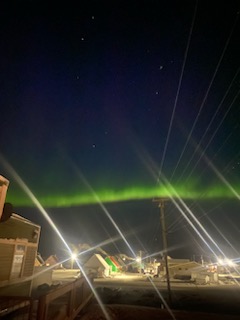Local Edmontonian helping to save lives in Nunavut
By Seanna Csernyanszki on April 13, 2023
Ground Search and Rescue is important for any climate in Canada. But especially in harsher climates with less light and visibility during the colder months like Nunavut. The temperatures last year dropped below -67 degrees.
Imagine getting lost in a cold climate with vast amounts of land and having no service. How is anyone going to find you?
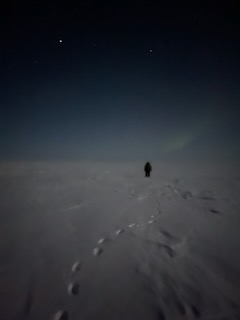
NEM has developed its own Nunavut-based SAR training program and has been training teams in the territory since January 2020. This training is the first of its kind for Nunavut with GPS and InReach.
Matthew Blencowe, from Edmonton, is an instructor in Ground Search and Rescue, and survival techniques in Nunavut and the surrounding area.
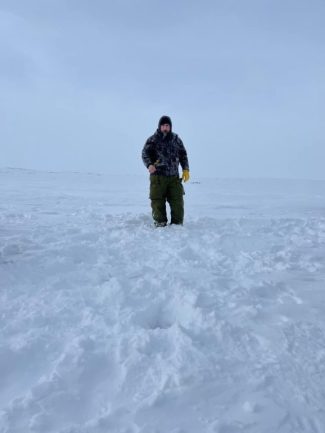
Q: How did you get into doing Ground Search and Rescue, and how long have you been doing it?
A: I have been involved for two years, the last two winters. I got involved with this company because of the guys I served with in the Canadian Armed Forces. They thought I would be a good fit so they reached out to me and I jumped all over the opportunity
Q: What are the physical demands of Search and Rescue?
A: The amount of time and the exposure that you are out in the elements. Nobody gets lost on a perfect day, but it is really cold up in Nunavut. The coldest temperature we got to this year was minus 67. Frostbite doesn’t take long to take effect. If you go out there and you are not properly equipped for the weather, it’ll chew you up and spit you out.
Q: Can you tell me some of the techniques that you use?
A: So primarily the techniques that we use are GPS’s and satellites. The more satellites that are up in the air the better luck we are going to have with finding somebody. The communities up there have a program where they use spot devices. The spot device will send a signal from where they are to regional headquarters. And with the Nunavut Emergency Management, they get a signal from the spot device and it gives you an exact location of where those people are.
Q: When you or others go out for rescues are there certain things that you have to do to keep yourselves safe to be able to get to who you are rescuing?
A: The biggest thing is not making someone else’s emergency your emergency. The thing about that is if you look at a situation where somebody goes through the ice right? Or somebody’s drowning in the water that person is panicking. They are going to latch onto whatever is near, whatever is going to save them.
That can and has led to other people being brought into that emergency. They are now becoming casualties themselves. Being prepared for what you are getting into, making sure that all the snow machines have fuel, everybody has radios, we know where everybody is going and we are leaving with the same amount of people that we started with.
Q: Have you ever been called out to perform a Search and Rescue while you were instructing in a community?
A: Yeah, we have. Just about a month ago I was up in a place called Sanikiluaq in Nunavut and two hunters went out that had been overdue for four days or so. We schooled up and went out to look for him.
They were on their way to their hunting grounds where they were going to go hunting for seals. They encountered another two hunters who had broken down. For the next three days they tried to fix the snow machine with the resources that they had and on the morning of the fourth day, they said, this is beyond our skill set. We are running out of food and fuel. We have to turn around and go back. Later that night is when we encountered them and when we found them.
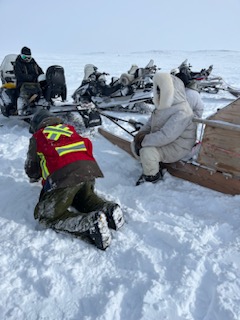
Q: How can someone get involved in learning about Search and Rescue?
A: So there are ground search and rescue teams all over depending on where you live. It’s a simple Google search. If you live somewhere like Nunavut, every community has a Ground Search and Rescue team.
Q: How long did you take training to become certified?
A: A lot of it was based on things that I had learned in the military. But the course I took was an intermediate Search Operations course, and it wasn’t designed to find people, but all of the same principles apply. That course was about six weeks long down in Missouri.
Q: What is the scariest part about a Search and Rescue?
A: How fast the landscape can turn on you. If someone was just going out and going on a hunting trip by themselves and they got turned around, and couldn’t figure out where they were, that panic kind of starts to set in. That element can be really real. But when you are on an actual Search and Rescue, even the exercises that we do, it’s not necessarily the scariest thing in the world because we are constantly checking in on our teammates and making sure that everybody in the group is good.
One of the things that we stress is that we do not bring family members on the search and rescue. Family members are not going to stop looking for their loved ones. And for Search and Rescue members, you have to recognize that if you’re going out for 8, 9, or 10 hours, you are going to be tired. The more tired you are, the less likely that you are going to have a positive outcome.
The wilderness is flat and with bright light and or low light, it can be hard to see. There are periods of 24-hour darkness up there and the animal threat is high. There are polar bears all over the place.
You have to be able to take care of yourself and realize that if you start feeling a bad kind of way you have to speak up and tell somebody so we can help you.
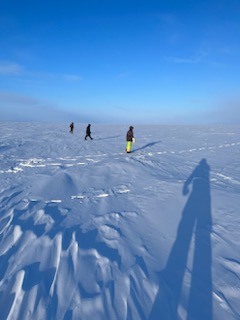
Q: When you go up for work, how often are you there and how often are you home?
A: Right now, I do about six weeks in the winter. We will go to different communities and teach the course. There is the potential of trying to do it again in the summer because people don’t just get lost in the winter and the landscape drastically changes between winter and summer. We are looking at expanding on that opportunity, but generally speaking, we are in each community for about a week at a time.
Q: Besides the physical aspects, what are the unexpected challenges of being on a Search and Rescue team?
A: Vehicle breakdowns, things not going according to plan. The lack of volunteers is a big one. Physical challenges with the weather, right? Most of the Inuit are good but you will notice that when you see them, they have all got deep scars and they are missing fingers. They have all had one way or another a touch of frostbite.
And for a southerner like me trying to avoid that is pretty top of the mind at all times.
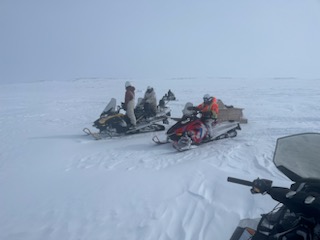
Q: What can someone do to stay safe when they find themselves in a situation where they would need Search and Rescue?
A: The biggest thing and this is all over the globe, not just specific to the Arctic where I work. If you find yourself turned around just don’t panic. Take a couple of breaths and get some oxygen into your brain. When you panic about things, your brain becomes traumatized, you start this slowly degrading circle and you start making bad decisions. The biggest thing that you can do is try to find yourself an area that people will traverse like a high point, a high feature, something that’s man-made if it is available, something that is going to draw the attention of other people.
If you are out in the middle of nowhere and you are in the tree line, make yourself a shelter and get a fire going. Lastly, realize that you could potentially be there for the long haul and take it hour by hour, minute by minute.
If you are up in the Arctic and your snow machine breaks down and you’ve got a spot device, you’re 90 kilometres away from town, and you didn’t tell anybody you were going hit the spot device and wait for somebody to come to get you, because they are coming to get you.
Q: Is it common to have the spot device?

A: We are trying to instill that in the people up there. That they need to take it with them because in reality if we’re going to go on a ground search and rescue, it’s a lot easier if we know where we have to go. Versus, you know, someone saw him leave town and Head East three days ago. We don’t know where he went. Don’t know what he is doing, think he might have gone out to a cabin or something, 40 kilometres away. And we get to that cabin and there are no signs, no tracks, no snow machine, that kind of thing.
Q: How many calls would you say you have received this year?
A: As an instructor, we don’t receive that many. Everyone has their jobs Monday to Friday and on the weekends that’s when people like to take off. They will drop everything and go hunting if the Caribou are around.
We have not experienced that many calls, but we have been stood up for a lot of things. But genuine Ground Search and Rescue calls, there have not been that many that I have been with. That is predominantly because most of the people up there do know how to take care of themselves.
